Related Research Articles
Gnaeus Domitius Afer was a Roman orator and advocate, born at Nemausus (Nîmes) in Gallia Narbonensis. He flourished in the reigns of Tiberius, Caligula, Claudius and Nero. He was suffect consul in the nundinium of September to December 39 as the colleague of Aulus Didius Gallus.
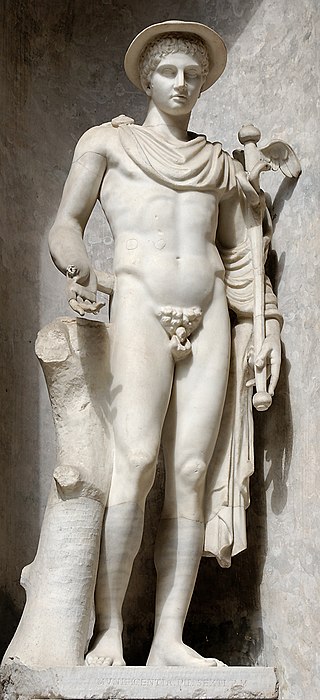
Hermes is an Olympian deity in ancient Greek religion and mythology. Hermes is considered the herald of the gods. He is also considered the protector of human heralds, travellers, thieves, merchants, and orators. He is able to move quickly and freely between the worlds of the mortal and the divine, aided by his winged sandals. Hermes plays the role of the psychopomp or "soul guide"—a conductor of souls into the afterlife.
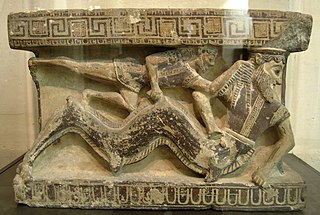
Triton is a Greek god of the sea, the son of Poseidon and Amphitrite, god and goddess of the sea respectively. Triton lived with his parents in a golden palace on the bottom of the sea. Later he is often depicted as having a conch shell he would blow like a trumpet.

Castalia, in Greek mythology, was a naiad-nymph of Phocis, a daughter of the river-god Achelous who inhabited the Castalian spring in Delphi. Mythology connects her to Apollo, the god of Delphi.
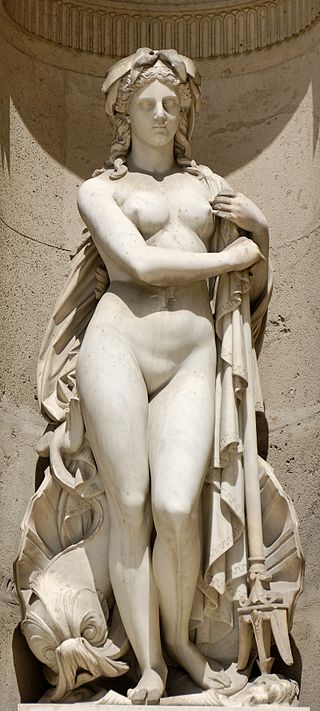
In ancient Greek mythology, Amphitrite was the goddess of the sea, the queen of the sea, and the wife of Poseidon. She was a daughter of Nereus and Doris. Under the influence of the Olympian pantheon, she became the consort of Poseidon and was later used as a symbolic representation of the sea. Her Roman counterpart is Salacia, a comparatively minor figure, and the goddess of saltwater.

Gnaeus Domitius Ahenobarbus was a general and politician of ancient Rome in the 1st century BC.

Enyo is a goddess of war in Greek mythology. She frequently is associated with the war god Ares. The Romans identified her with Bellona. She also has similarities with the Anatolian goddess Ma.
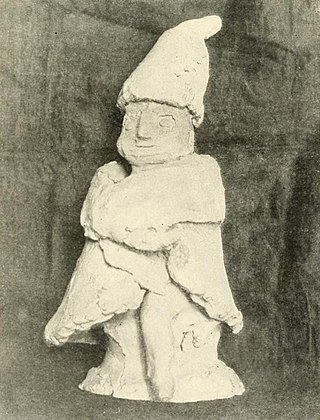
A household deity is a deity or spirit that protects the home, looking after the entire household or certain key members. It has been a common belief in paganism as well as in folklore across many parts of the world.

Gnaeus Domitius Ahenobarbus was a member of the imperial Julio-Claudian dynasty of Ancient Rome. Domitius was the son of Antonia Major. He married Agrippina the Younger and became the father of the Emperor Nero.

Lucius Domitius Ahenobarbus was the son of consul Gnaeus Domitius Ahenobarbus and Aemilia Lepida. His mother was a paternal relative of the triumvir Marcus Aemilius Lepidus. His paternal grandmother was Porcia. Ahenobarbus married Antonia Major and through his son with her he became the grandfather of emperor Nero.
Gnaeus Domitius Ahenobarbus was tribune of the people in 104 BC. He was the son of Gnaeus Domitius Ahenobarbus, and brother of Lucius Domitius Ahenobarbus. The College of Pontiffs elected him pontifex maximus in 103.
Lucius Domitius Ahenobarbus, consul in 54 BC, was an enemy of Julius Caesar and a strong supporter of the aristocratic party in the late Roman Republic.
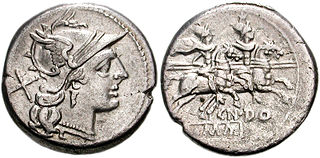
Gnaeus Domitius Ahenobarbus was son of the Gnaeus Domitius Ahenobarbus who had been consul in 192 BC, was chosen pontifex in 172 BC when still a young man, and in 169 BC was sent with two others as commissioners into Macedonia. In 167 BC he was one of the ten commissioners for arranging the affairs of Macedonia in conjunction with Aemilius Paulus; and when the consuls of 162 BC abdicated on account of some fault in the auspices in their election, he and Cornelius Lentulus were chosen consuls in their stead.

A major branch of classical mythology, Greek mythology is the body of myths originally told by the ancient Greeks, and a genre of ancient Greek folklore. These stories concern the origin and nature of the world, the lives and activities of deities, heroes, and mythological creatures, and the origins and significance of the ancient Greeks' own cult and ritual practices. Modern scholars study the myths to shed light on the religious and political institutions of ancient Greece, and to better understand the nature of myth-making itself.

A liminal deity is a god or goddess in mythology who presides over thresholds, gates, or doorways; "a crosser of boundaries". These gods are believed to oversee a state of transition of some kind; such as, the old to the new, the unconscious to the conscious state, the familiar to the unknown.

In ancient Roman religion, the indigitamenta were lists of deities kept by the College of Pontiffs to assure that the correct divine names were invoked for public prayers. These lists or books probably described the nature of the various deities who might be called on under particular circumstances, with specifics about the sequence of invocation. The earliest indigitamenta, like many other aspects of Roman religion, were attributed to Numa Pompilius, second king of Rome.
The Altar of Domitius Ahenobarbus is a series of four sculpted marble plaques that probably decorated a base supporting cult statues in the cella of a Temple of Neptune located in Rome on the Field of Mars.
The gens Domitia was a plebeian family at ancient Rome. The first of the gens to achieve prominence was Gnaeus Domitius Calvinus, consul in 332 BC. His son, Gnaeus Domitius Calvinus Maximus, was consul in 283, and the first plebeian censor. The family produced several distinguished generals, and towards the end of the Republic, the Domitii were looked upon as one of the most illustrious gentes.
References
- ↑ "DOMIDUCA, DOMIDUCUS, Roman Mythology Index". Archived from the original on 2012-02-27. Retrieved 2009-12-06.
- ↑ St Augustine (trans. R. W. Dyson) The City of God against the pagans, Cambridge Texts in the History of Political Thought, 1998, pp. 258, 1198.